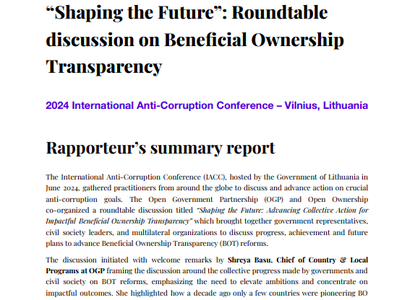Armenia breaks new ground with extractives disclosures

Globally, more than 90 countries have made commitments to establish beneficial ownership (BO) registers, but there are still comparatively few examples of full implementation and publication. Each new experience of implementation provides significant learnings on how to optimise reforms to produce better quality and more impactful data.
The case of Armenia, as our newly released scoping study demonstrates, is no exception. The country has made commendable progress in moving rapidly from initial commitments to publishing its first sets of data. In April 2020, Armenia EITI published its BO data from a mining sector pilot programme and is now on track to approve legislation that will require disclosures across the economy by the end of year.
Reform drivers
Rapid progress in Armenia is partly thanks to Prime Minister Nikol Pashinyan and the ruling My Step Alliance party’s central anti-corruption agenda. The My Step Alliance party came into power following the “Velvet Revolution” in 2018. Within its policy programme, Pashinyan’s administration has prioritised ownership transparency in the mining sector, due to the industry’s economic importance – the sector contributes around 7.1% of annual state revenues – and because of persistent allegations of corruption involving extractive projects.
The cause of beneficial ownership transparency (BOT) in the mining sector has been enthusiastically taken up by civil society organisations involved in campaigns linked to proposed extractive developments. Environmental NGOs opposed to certain mining projects have been a key source of ongoing pressure: first, on the government to advance the reforms, and second: on the firms to disclose their BO data. Their keen interest in the topic has also led to a number of analysis pieces on the mining sector disclosures within days of publication in April 2020.
For their part, firms operating in the sector have made determined efforts to identify the relevant BO data by the deadline. This has been reflected by high rates of compliance with the disclosure legislation, with several firms even reportedly submitting more data to authorities than what is required by law.
CSO and private sector engagement with the design and implementation of the BO disclosure regime has been actively promoted by Armenia’s government, with extensive engagement via the EITI Multi-Stakeholder Group (MSG). This has enabled open discussions about the challenges and limitations of any regulatory framework, and helped provide realism about the trade-off between data quality and data-scope.
Open Ownership in Armenia
Whilst government agencies responsible for Armenia’s BO programme worked through these issues, Open Ownership (OO) has provided our highest level of technical assistance on both policy- and systems-related issues. This has included: providing detailed input on the design of Armenia’s data collection processes; advising on how to improve the usability of BO disclosure forms and ensuring they accurately reflect legislative requirements; and creating visual aids and graphical exercises to help stakeholders determine the desired scope of disclosure requirements. This ongoing support has been delivered under the framework of a Memorandum of Understanding signed with the Ministry of Justice in October 2019.
In December 2019, OO shared the initial assessment and recommendations for the extractives register with government implementers and other stakeholders. This contained 12 recommendations to strengthen the effectiveness of Armenia’s extractives register; to date four of these have been implemented, and implementation of a further four is underway and ongoing with OO’s support.
Today’s release of the Armenia Scoping Study is designed to assist local stakeholders in their decision-making as they expand the application of Armenia’s disclosure regime beyond the mining sector. The report, structured around OO’sPrinciples of Effective Beneficial Ownership Disclosure, provides an analysis of how Armenia’s implementation compares to OO’s good practice principles. In each case, we make recommendations about how the country could further strengthen its policies and processes to improve the quality, utility, and impact of its data.
A crucial advance towards this goal will come once Armenia completes its transition away from publication of PDF scans to releasing BO information in machine-readable format. Armenia is already in the early stages of creating such a system in the coming months, which is due to comply with OO’s Beneficial Ownership Data Standard (BODS); a digital format that enables BO data to be published in a machine-readable format that can be easily understood and connected with other datasets.
Next steps
Expanding the scope of disclosure requirements from the extractives sector to cover the whole economy will help tackle corruption and criminality more widely. Significant state support to companies during the coronavirus pandemic – including via a new USD280 million loan facility granted by the IMF in May and a series of loan and co-financing schemes for local businesses – hastens the need to ensure government funds are going to legitimate companies. This is particularly the case for emergency health-related procurement.
The existence of a broadly positive political context for reform, as well as the presence of an engaged group of local data users, bodes well for the potential future impact of Armenia’s BO data disclosures. Government agencies, moreover, have learned lessons from the initial pilot programme and have already made improvements to the policies and systems necessary for the upcoming economy-wide disclosure regime.
Armenia’s experience of implementation is anticipated to yield key lessons regarding the conditions necessary for a comparatively rapid creation of a centralised, public register of BO. It will also provide useful insights over the reform roadmap for implementers in countries like Mexico, Nigeria, and Ghana to pursue when they later come to transitioning from a planned single-sector register to an economy-wide disclosure regime.
Photo by Gevorg Avetisyan on Unsplash


